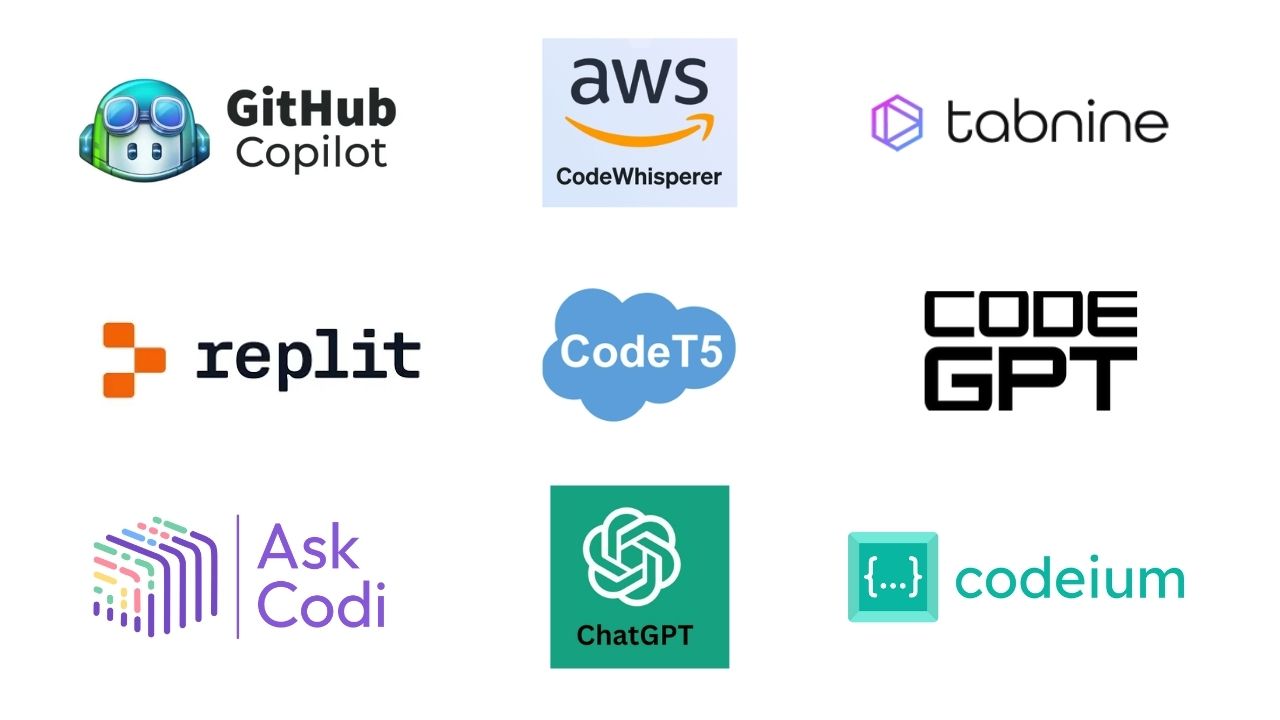
Workshop: Exploring Microservices Through Industry Examples
Artificial Intelligence (AI) is revolutionizing software development by enhancing productivity, improving code quality, and automating routine tasks. Developers now have access to various AI-powered tools that assist in coding, debugging, and documentation. This article provides a detailed overview of the best AI programming tools in 2024.

1. GitHub Copilot
It is one of the most popular AI-powered coding assistant tools developed by GitHub and OpenAI. It uses OpenAI’s Codex, a language model trained on a vast amount of code from public repositories on GitHub.
Key Features
- Real-time Code Suggestions: Provides intelligent code completions as you type, suggesting whole lines or blocks of code.
- Multi-language Support: Supports a wide range of programming languages including Python, JavaScript, TypeScript, Ruby, and Go.
- Integration with IDEs: Works seamlessly with Visual Studio Code, Visual Studio, JetBrains suite, Neovim, and more.
Pros
- Enhanced Productivity: Helps developers write code faster by providing context-aware suggestions.
- Learning Tool: Useful for beginners to learn coding patterns and best practices.
- Community Support: Large user base and active community contributing to continuous improvement.
Cons
- Privacy Concerns: Since it is trained on public repositories, there may be concerns about code privacy and intellectual property.
2. Amazon CodeWhisperer
Amazon CodeWhisperer is a machine learning-powered code suggestion tool from Amazon Web Services (AWS). It aims to help programmers write code faster and more securely.
Key Features
- Contextual Code Recommendations: Offers code suggestions based on the context of your existing code and comments.
- Security Integration: Integrates with Amazon CodeGuru to scan for security vulnerabilities in your code.
- Multi-language Support: Supports popular languages including Python, Java, JavaScript, TypeScript, and more.
Pros
- Security Focus: Provides real-time security recommendations, helping developers write more secure code.
- AWS Ecosystem Integration: Works well within the AWS environment, making it a great choice for developers using AWS services.
- Accurate Code Suggestions: Delivers highly relevant code suggestions that adapt to your coding style.
Cons
- Limited Free Tier: Advanced features are available only in the paid version.
Also Read: Will Artificial Intelligence Replace Programmers?
3. Tabnine
Tabnine is an AI-powered code completion tool that integrates with popular IDEs. It uses deep learning models to predict and suggest code completions.
Key Features
- Deep Learning Models: Uses advanced AI models to provide accurate code completions.
- Privacy and Security: Offers on-premise deployment options, ensuring code privacy and security.
- IDE Integration: Compatible with VSCode, IntelliJ, Sublime Text, Atom, and more.
Pros
- Enhanced Productivity: Significantly speeds up coding by providing relevant code suggestions.
- Privacy Control: On-premise deployment ensures that sensitive code remains secure.
- Supports Multiple Languages: Provides support for a wide range of programming languages.
Cons
- Resource Intensive: Running deep learning models locally can be resource-intensive.
4. Replit AI
Replit AI is part of the Replit platform, an online IDE that offers a collaborative coding environment with built-in AI tools for code completion and debugging.
Key Features
- Collaborative Coding: Allows multiple developers to work on the same codebase simultaneously.
- AI Code Completion: This feature offers intelligent code completions depending on the context of your code.
- Multi-language Support: Supports a variety of programming languages including JavaScript, Python, and HTML/CSS.
Pros
- Real-time Collaboration: Enhances teamwork by allowing real-time collaboration on code.
- Educational Tool: Great for learning and teaching coding due to its user-friendly interface and collaborative features.
- Integrated AI Tools: AI-powered code suggestions and debugging tools improve coding efficiency.
Cons
- Limited Offline Use: Being an online platform, it requires an internet connection to access.
5. CodeT5
CodeT5, developed by Salesforce, is an open-source AI model designed for code understanding and generation tasks. It leverages a transformer-based architecture similar to that of GPT-3.
Key Features
- Text-to-Code Generation: Converts natural language descriptions into code.
- Code-to-Code Translation: Translates code from one programming language to another.
- Code Summarization: Generates summaries of code snippets to explain their functionality.
Pros
- Versatile Tool: Useful for various tasks including code generation, translation, and summarization.
- Open Source: Being open-source, it is freely available for use and customization.
- Community Support: Active development and support from the open-source community.
Cons
- Requires Setup: May require setup and configuration for optimal use.
6. CodeGPT
CodeGPT is a VSCode extension that provides AI-driven code assistance using various models, including OpenAI’s GPT-3.
Key Features
- AI Chat Assistance: Allows you to ask coding-related questions and get instant answers.
- Auto-completion and Error Checking: Provides intelligent code completions and checks for errors.
- Model Flexibility: Supports multiple AI models from different providers like OpenAI and Microsoft Azure.
Pros
- Instant Assistance: Offers real-time assistance, reducing the need to search for solutions online.
- Enhanced Productivity: Speeds up coding by providing relevant suggestions and error corrections.
- Flexible Integration: Works with various AI models, giving users flexibility in choosing the best one for their needs.
Cons
- Limited to VSCode: Currently only available as a VSCode extension.
7. AskCodi
AskCodi, powered by OpenAI GPT, offers a suite of tools to assist with coding, documentation, and error correction.
Key Features
- Code Generation: Generates code snippets based on natural language descriptions.
- Documentation Assistance: Helps in creating and improving code documentation.
- Error Correction: Identifies and suggests fixes for coding errors.
Pros
- Comprehensive Toolset: Provides a wide range of functionalities beyond just code completion.
- Improves Code Quality: Assists in writing cleaner and well-documented code.
- User-friendly: Easy to use, making it suitable for both beginners and experienced developers.
Cons
- Requires OpenAI API: Relies on access to OpenAI’s API, which may involve costs.
8. ChatGPT
ChatGPT by OpenAI is a versatile AI chatbot that can assist with various coding tasks, including writing, debugging, and planning.
Key Features
- Versatile Use Cases: Can be used for coding, debugging, brainstorming, and more.
- Follow-up Questions: Capable of asking follow-up questions to better understand your queries.
- Code Review: Can help identify and correct errors in your code.
Pros
- Flexible Tool: Useful for a wide range of tasks beyond just coding.
- Improves Debugging: Helps in identifying and fixing coding errors.
- Easy Access: Available for free with additional features in the Plus plan.
Cons
- Limited Context Retention: May lose track of context in longer conversations.
9. Codeium
Codeium is an AI-powered code completion and generation tool that focuses on enhancing coding productivity and accuracy.
Key Features
- AI-driven Code Suggestions: Provides intelligent code completions and suggestions.
- Multi-language Support: Supports various programming languages, enhancing its versatility.
- Integration with IDEs: Compatible with popular IDEs like VSCode and JetBrains.
Pros
- Enhanced Productivity: Speeds up coding by providing relevant suggestions.
- Improves Code Quality: Helps in writing cleaner and more efficient code.
- Easy Integration: Works seamlessly with popular development environments.
Cons
- Dependency on AI Models: Performance depends on the quality and training of the underlying AI models.
Final Thoughts
AI-powered tools are transforming the landscape of software development by automating routine tasks, improving code quality, and enhancing productivity. From GitHub Copilot’s real-time code suggestions to Amazon CodeWhisperer’s security-focused recommendations, these tools offer a variety of features to assist developers at every stage of the coding process. Whether you are a beginner looking to learn best practices or an experienced developer aiming to boost productivity, there is an AI tool tailored to your needs.
The post 9 Best AI Tools for Programming Assistance in 2024 appeared first on The Crazy Programmer.


